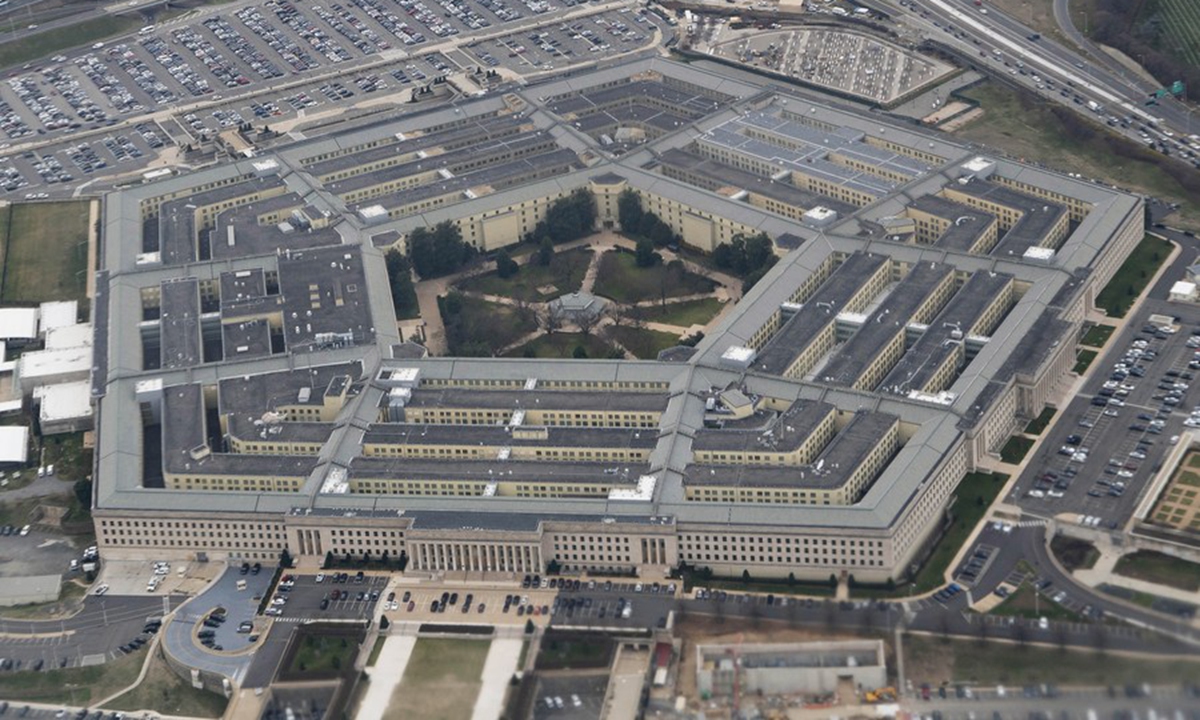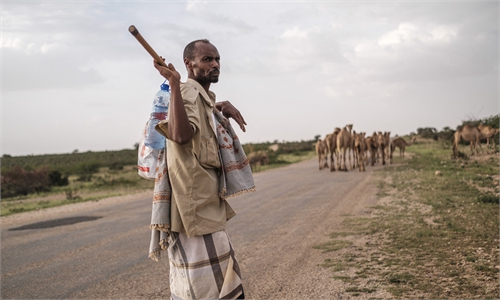
Photo taken on Feb. 19, 2020 shows the Pentagon seen from an airplane over Washington D.C., the United States. Photo: Xinhua
US President Joe Biden has approved a request from the Secretary of Defense to reestablish a persistent military presence in Somalia to enable a more effective fight against al-Shabaab, a Somali group that the US designated as a foreign terrorist organization in March 2008, the White House said on May 16. US media cited a US official as reporting that "under 500" troops will return to the country. This move reverses a previous decision in 2020 by former president Donald Trump to withdraw forces from the East African country.Historically, the US military's memories toward Somalia are not good. In the aftermath of the "Black Hawk Down" in 1993, bodies of dead US soldiers were dragged through the streets by Somalis. This triggered criticism toward the then Bill Clinton administration and created pressure for a withdrawal of US forces. The "Black Hawk Down" became an unforgettable pain for US military and it changed American policy on the continent.
Against such a backdrop, why would the Biden administration now reverse Trump's decision? It has its own considerations. In short, under the guise of "counter-terrorism," the US hopes its re-entry of the Horn of Africa can better serve its interests.
The Trump administration's Africa policy was extreme. Trump's manner toward the region was contemptuous: Being indifferent to African affairs, portraying the continent as "shithole countries," and never visiting any African country during his presidency.
By contrast, Biden sees the African continent from the perspective of global security architecture. Situated in the Horn of Africa, which is a vital part of global security landscape, and acting as a gateway between the Indian Ocean and the Red Sea leading to the Mediterranean, Somalia is of highly significance in terms of its strategic location. But various security risks have been seen in the region, not only in Somalia, but also in neighboring Ethiopia and Sudan.
Furthermore, the Biden administration's recent focus has been on Europe, involving efforts to crack down and contain Russia on a global basis. However, Moscow has remained a strong influence in Africa, especially in the Horn of Africa, which the US is vigilant to. Particularly, Eritrea bolsters Russia in the ongoing Ukraine crisis. The country is the only African country that voted against the United Nations General Assembly resolution demanding Russia to withdraw its military forces from Ukraine - a strong statement of support for Moscow. Thus, the Biden administration will not leave the region alone.
In addition, Washington has determined China to be its primary rival and has repeatedly stated that China aims to expand its influence in Africa. China appointed a senior diplomat to a newly created post of special envoy for the Horn of Africa affairs in February. Many countries on the continent have since joined the China-proposed Belt and Road Initiative. The only overseas support base belonging to China presently is in Djibouti, which is also located in the Horn of Africa. These developments all have aroused Washington's concern.
These considerations will prevent Biden from neglecting this region. Re-deploying troops in Somalia can also better help the US collect intelligence, especially pieces on China and Russia, so that it can formulate strategies to try and contain the two countries.
Moreover, Somalia is reportedly one of the last major unexplored petroleum frontiers globally. In February, both the president and the prime minister of Somalia rejected an oil exploration deal signed with a US company, hours after it was signed out of the concern to protect the country's national resources. Washington may be very unhappy with this result. The US oil industry's lobbying influence on the government is very powerful, and today, in the context of oil prices surging and global energy crisis, the US called for OPEC to increase production, but the UAE and Saudi Arabia have been unwilling to heed America's requests. Given that Somalia's oil has not been occupied by any particular country, it's unsurprising to see Washington's attempt to ramp up its control over the region to pursue access to strategic energy resources.
In addition, it is noticeable that the day before the White House announced its decision to redeploy US troops to Somalia, the country held a presidential election. Hassan Sheikh Mohamud, who served as Somalia's president between 2012 and 2017, won the contest.
The possibility cannot be ruled out that Washington deliberately announced the redeployment of troops to Somalia in conjunction with the election in order to deter the new government not to make any decisions that may undermine American interests. In the name of "counter-terrorism," Washington ultimately hopes to strengthen connections with the local population, keeping track of it and increasing its influence over the new government.
In terms of the attempts of "counterterrorism" as it describes, Washington may also deter al-Shabaab to some extent but the effect of this will be very limited.
The author is a senior research fellow of the Charhar Institute and the Institute of West-Asian and African Studies at the Chinese Academy of Social Sciences. opinion@globaltimes.com.cn



